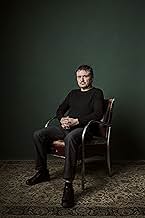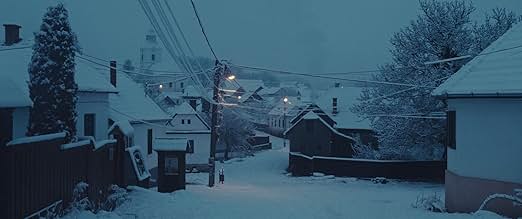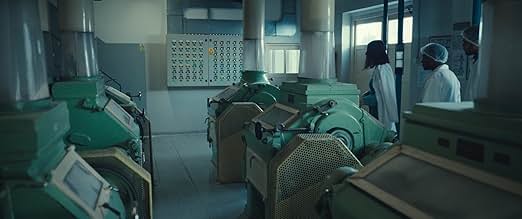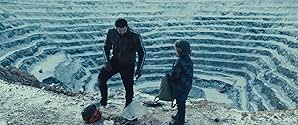AVALIAÇÃO DA IMDb
7,2/10
6,3 mil
SUA AVALIAÇÃO
Uma análise sem julgamento das forças motrizes do comportamento humano face ao desconhecido, da forma como percebemos o outro e de como nos relacionamos com um futuro incerto.Uma análise sem julgamento das forças motrizes do comportamento humano face ao desconhecido, da forma como percebemos o outro e de como nos relacionamos com um futuro incerto.Uma análise sem julgamento das forças motrizes do comportamento humano face ao desconhecido, da forma como percebemos o outro e de como nos relacionamos com um futuro incerto.
- Prêmios
- 7 vitórias e 18 indicações no total
Endre Rácz
- Tibi
- (as Rácz Endre)
Avaliações em destaque
Greetings again from the darkness. Welcome to 'Hypocriteville". Or the town of Bigotry. Or Xenophobia City. Regardless how vile each of these labels might be, they each fit in the Transylvania community at the heart of writer-director Christian Mungiu's latest film. Of course, as with most derogatory labels, the accused would never admit the shoe fits, and paraphrasing Shakespeare, would likely protest too much. Mungiu's brilliant 2007 Palme d'Or winner 4 MONTHS, 3 WEEKS AND 2 DAYS was inexplicably not nominated for a Best Foreign Language Oscar, and he proves again his unique mastery of the medium.
Our introduction to Matthias (Marin Grigore) occurs as he violently head butts his rude supervisor after being disrespected. Matthisas then returns to his home community where he encounters Ana (Macrina Barladeanu), the mother of his young son. Rudi (Mark Edward Blenyesi) is 8 years old, and he has recently witnessed something in the forest that has frightened him into silence. Ana does what she can to comfort him, while Matthias pushes him to 'man up' and face his fears. Matthias also re-connects with his former lover, Csilla (Judith State), who is the manager of the local bakery in town.
Csilla is working diligently to hire more employees at the bakery in order to qualify for grant money. The problem is that no locals want to work for minimum wage. Instead, many locals head to Germany and other areas for higher paying jobs, and the conflict arises when Csilla hires a couple of men from Sri Lanka. It's at this point where this mishmash of citizens begins their racist rants ... this despite being a mixed community where many friends and family member have headed out to find jobs in other areas. "Not in my backyard" is a phrase used so often in communities fighting against some cause, and that's exactly what's happened here.
Mungiu's excellent film peaks with a 15 minute (or more) single take scene - a town hall meeting where a couple of dozen citizens speak out showing their small-mindedness. It's painful to watch, yet also mesmerizing. Csilla and Matthias are front and center for the scene and both are superb, especially Csilla's facial reactions and Matthias' cowering (this after flaunting his powerful masculinity for so much of the film). By the time this scene concludes, this viewer was mentally exhausted while also being in awe. It's this reaction which makes that final scene so confounding and seemingly out of place. Mungiu taps into the human behavior that we so often question these days, and he does so in a way that never preaches or judges. It's truly exceptional filmmaking ... except that final scene.
Opens April 28, 2023.
Our introduction to Matthias (Marin Grigore) occurs as he violently head butts his rude supervisor after being disrespected. Matthisas then returns to his home community where he encounters Ana (Macrina Barladeanu), the mother of his young son. Rudi (Mark Edward Blenyesi) is 8 years old, and he has recently witnessed something in the forest that has frightened him into silence. Ana does what she can to comfort him, while Matthias pushes him to 'man up' and face his fears. Matthias also re-connects with his former lover, Csilla (Judith State), who is the manager of the local bakery in town.
Csilla is working diligently to hire more employees at the bakery in order to qualify for grant money. The problem is that no locals want to work for minimum wage. Instead, many locals head to Germany and other areas for higher paying jobs, and the conflict arises when Csilla hires a couple of men from Sri Lanka. It's at this point where this mishmash of citizens begins their racist rants ... this despite being a mixed community where many friends and family member have headed out to find jobs in other areas. "Not in my backyard" is a phrase used so often in communities fighting against some cause, and that's exactly what's happened here.
Mungiu's excellent film peaks with a 15 minute (or more) single take scene - a town hall meeting where a couple of dozen citizens speak out showing their small-mindedness. It's painful to watch, yet also mesmerizing. Csilla and Matthias are front and center for the scene and both are superb, especially Csilla's facial reactions and Matthias' cowering (this after flaunting his powerful masculinity for so much of the film). By the time this scene concludes, this viewer was mentally exhausted while also being in awe. It's this reaction which makes that final scene so confounding and seemingly out of place. Mungiu taps into the human behavior that we so often question these days, and he does so in a way that never preaches or judges. It's truly exceptional filmmaking ... except that final scene.
Opens April 28, 2023.
RMN is the Romanian translation of "MRI" - the medical machine which takes deep images of the human body including the brain. In a way, renowned Director Cristian Mungiu (4 MONTHS, GRADUATION) is examining the inner souls of his fellow countryman. An X-Ray if you will.
Mungiu's screenplay is set in a small Transylvanian village. Mattias (Marin Grigore), a brute of a man, has returned from a job for hire in Germany to reunite with his estranged wife Ana (Macrina Barladeanu) and young son Rudi (Mark E. Blenyesi) who claims to have seen something so horrible that he can barely speak. Csilla (Judith Slate) manages a local bakery and is also Mattias' old flame. There are obvious tensions, but the town is seemingly idyllic with its snow-capped mountains, abundant livestock and quiet lifestyles.
The outward peace begins to crack when Csilla's bakery is forced to hire three migrants from Sri Lanka to keep operating. The locals have balked at working for minimum wage, but, before long they aim their ire at the black workers who they equate with invading gypsies. Soon the entire populace is riled by their presence, this despite the village's own checkered history with immigration, not to mention so many of they themselves going overseas for work - doubly so now that Romania has joined the E. U..
Mungiu's intentions are clear, but, he doesn't take a direct route. His concerns are more with exploring the inner psychological forces of the villagers' behavior more than their direct actions. The key sequence is a fifteen minute long single take which places Mattias and Csilla as the focus of the frame, while the townspeople rail on airing predictable grievances.
Mungiu's method includes a pair of visual metaphors and a premonition of sorts. The script doesn't all work and the strain of drawing it all together as a whole shows at times. Still, R. M. N. Is a reminder of how universal prejudice and the various incarnations of injustice can be. The acting by Slate and Grigore in particular is quite strong and Mungiu's rigorous intelligence make a definite impact. There are a pair of arresting images towards the end that are hauntingly effective.
Mungiu's screenplay is set in a small Transylvanian village. Mattias (Marin Grigore), a brute of a man, has returned from a job for hire in Germany to reunite with his estranged wife Ana (Macrina Barladeanu) and young son Rudi (Mark E. Blenyesi) who claims to have seen something so horrible that he can barely speak. Csilla (Judith Slate) manages a local bakery and is also Mattias' old flame. There are obvious tensions, but the town is seemingly idyllic with its snow-capped mountains, abundant livestock and quiet lifestyles.
The outward peace begins to crack when Csilla's bakery is forced to hire three migrants from Sri Lanka to keep operating. The locals have balked at working for minimum wage, but, before long they aim their ire at the black workers who they equate with invading gypsies. Soon the entire populace is riled by their presence, this despite the village's own checkered history with immigration, not to mention so many of they themselves going overseas for work - doubly so now that Romania has joined the E. U..
Mungiu's intentions are clear, but, he doesn't take a direct route. His concerns are more with exploring the inner psychological forces of the villagers' behavior more than their direct actions. The key sequence is a fifteen minute long single take which places Mattias and Csilla as the focus of the frame, while the townspeople rail on airing predictable grievances.
Mungiu's method includes a pair of visual metaphors and a premonition of sorts. The script doesn't all work and the strain of drawing it all together as a whole shows at times. Still, R. M. N. Is a reminder of how universal prejudice and the various incarnations of injustice can be. The acting by Slate and Grigore in particular is quite strong and Mungiu's rigorous intelligence make a definite impact. There are a pair of arresting images towards the end that are hauntingly effective.
Cristian Mungiu is undoubtedly the best Romanian director working nowadays. He got famous for winning the Palme d'Or in 2007 for his masterpiece "4 Months, 3 Weeks and 2 Days", but hasn't stopped making great films afterwards. "R. M. N." (Magnetic Resonance Imaging in Romanian) is no exception - a gripping social thriller which explores the melting point of socioeconomic forces and simple human emotions.
I had the enorme chance of attending a screening with Cristian Mungiu attending himself. Unlike other directors, he took more than one hour afterwards to discuss the film with the audience, not hesitating to even answer difficult questions in detail. R. M. N. Is a great film, but not an easy one as it's on purpose not filmed how an American film would be filmed (that's what Mungiu said himself) - so I was extremely happy that he explained a lot of the film, it turned out to be one of the most interesting discussions I've ever attended.
Although the film is slow, and at first difficult to access, it's worth sitting through, as Mungiu rewards audiences with an extraordinary showdown in form of a debate in a 17-minute single shot - one of the greatest scenes of the year. The event is based on a a real event of xenophobia and hate which left its mark on Romanian society a few years ago.
The film starts by introducing its protagonist, a monosyllabic man named Matthias who returns home after violently attacking the manager of the German slaughterhouse he works in. Once back in his Romanian village, more conflicts await him, as he's met by a distant wife, an emotionally damaged child and a lover who is quite the opposite of him - she turns out to be the hero of the film, the character we identify ourselves with. When I asked Mungiu why he chose to make an unsympathetic and brutal character as his protagonist, he explained that he didn't want to choose an American approach, that the audience always has to understand, like or identify with the main character. Furthermore, the contrast between the regressive and closed Matthias and the liberal Csilla is meant to portray the inner struggle of every human, the struggle between rational choices and animalistic instincts.
This conflict - inside every human, but equally for the village's inhabitants as well as the two very different lovers - gets serious when the xenophobic event takes place in the village. Without ever accusing an entire group of people, Mungiu shows how every single one is responsible individually and how ideologies clash when communities neglected in the process of globalisation face the antagonistic effects of a market without borders.
Although not a film for the masses, R. M. N. Is once again a very rewarding achievement by the Romanian director, who regularly gives us brilliant insights into an interesting country we watch not enough films from. But as he said himself, has no aspirations to make an English-language film, as long as he still lives in Romania.
I had the enorme chance of attending a screening with Cristian Mungiu attending himself. Unlike other directors, he took more than one hour afterwards to discuss the film with the audience, not hesitating to even answer difficult questions in detail. R. M. N. Is a great film, but not an easy one as it's on purpose not filmed how an American film would be filmed (that's what Mungiu said himself) - so I was extremely happy that he explained a lot of the film, it turned out to be one of the most interesting discussions I've ever attended.
Although the film is slow, and at first difficult to access, it's worth sitting through, as Mungiu rewards audiences with an extraordinary showdown in form of a debate in a 17-minute single shot - one of the greatest scenes of the year. The event is based on a a real event of xenophobia and hate which left its mark on Romanian society a few years ago.
The film starts by introducing its protagonist, a monosyllabic man named Matthias who returns home after violently attacking the manager of the German slaughterhouse he works in. Once back in his Romanian village, more conflicts await him, as he's met by a distant wife, an emotionally damaged child and a lover who is quite the opposite of him - she turns out to be the hero of the film, the character we identify ourselves with. When I asked Mungiu why he chose to make an unsympathetic and brutal character as his protagonist, he explained that he didn't want to choose an American approach, that the audience always has to understand, like or identify with the main character. Furthermore, the contrast between the regressive and closed Matthias and the liberal Csilla is meant to portray the inner struggle of every human, the struggle between rational choices and animalistic instincts.
This conflict - inside every human, but equally for the village's inhabitants as well as the two very different lovers - gets serious when the xenophobic event takes place in the village. Without ever accusing an entire group of people, Mungiu shows how every single one is responsible individually and how ideologies clash when communities neglected in the process of globalisation face the antagonistic effects of a market without borders.
Although not a film for the masses, R. M. N. Is once again a very rewarding achievement by the Romanian director, who regularly gives us brilliant insights into an interesting country we watch not enough films from. But as he said himself, has no aspirations to make an English-language film, as long as he still lives in Romania.
The director as usual deals with gray areas of morality. No one is all good or bad. All characters - with all their qualities and vices - are simply put, human.
He is able to treat topics such as immigration, racism, east-west, identity politics, etc. Without falling into the trap of being judgmental or prescriptive. No slogans here. All issues depicted naturally through the normal flow of normal people's lives...
The single take in the town hall - which goes on for minutes - must be a milestone in film history! I cannot imagine how many takes he must have had to create this virtually impossible scene. In a single take, so many characters engaging in the liveliest dialogue for minutes...it was breathtaking.
R. M. N. Was 2 hours of a visual and dramatic feast. I cannot wait to see what this great director will produce for us next.
He is able to treat topics such as immigration, racism, east-west, identity politics, etc. Without falling into the trap of being judgmental or prescriptive. No slogans here. All issues depicted naturally through the normal flow of normal people's lives...
The single take in the town hall - which goes on for minutes - must be a milestone in film history! I cannot imagine how many takes he must have had to create this virtually impossible scene. In a single take, so many characters engaging in the liveliest dialogue for minutes...it was breathtaking.
R. M. N. Was 2 hours of a visual and dramatic feast. I cannot wait to see what this great director will produce for us next.
This is not a film for those of us who watch movies casually. If you pay close attention to the gloriously intricate details of this film, the ending will leave you speechless and full of ruminations for days (maybe even weeks) to come.
The characters in this film are not cartoonish one-note ideas -- they're complex full human beings. We have a brilliant anti-hero as our lead, a morally-confused "working woman" type as our second lead, and a village whole as our third lead. Think this sounds boring? Give the film a chance and let it seep in. It's firing on all cylinders - beautiful, moody, dark, socially-relevant without being preachy or preening.
Mungiu is a master and has yet to make a bad movie.
The characters in this film are not cartoonish one-note ideas -- they're complex full human beings. We have a brilliant anti-hero as our lead, a morally-confused "working woman" type as our second lead, and a village whole as our third lead. Think this sounds boring? Give the film a chance and let it seep in. It's firing on all cylinders - beautiful, moody, dark, socially-relevant without being preachy or preening.
Mungiu is a master and has yet to make a bad movie.
Você sabia?
- CuriosidadesMungiu named the film after a Romanian acronym for -nuclear magnetic resonance-, as the film is "an investigation of the brain, a brain scan trying to detect things below the surface".
- Trilhas sonorasYumenji's Theme
Composed by Shigeru Umebayashi for Amor à Flor da Pele (2000)
Principais escolhas
Faça login para avaliar e ver a lista de recomendações personalizadas
- How long is R.M.N.?Fornecido pela Alexa
Detalhes
Bilheteria
- Faturamento bruto nos EUA e Canadá
- US$ 46.360
- Fim de semana de estreia nos EUA e Canadá
- US$ 6.121
- 30 de abr. de 2023
- Faturamento bruto mundial
- US$ 738.520
- Tempo de duração2 horas 5 minutos
- Cor
- Proporção
- 2.39 : 1
Contribua para esta página
Sugerir uma alteração ou adicionar conteúdo ausente























